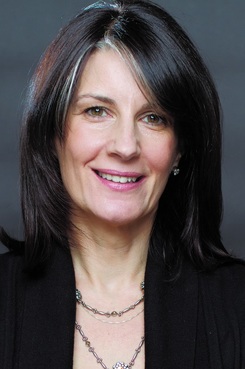Brand-New Ideas on Developing Your Brand
According to the Acritas U.S. Law Firm Brand Index for 2019, global law firm Jones Day—a firm with more than 2,500 lawyers and 43 offices worldwide—scored the top score (100 points) on the annual survey by the legal market intelligence company.
February 15, 2019 at 03:03 PM
6 minute read
 Meg Pritchard.
Meg Pritchard.For the third year in a row, one of the largest law firms in the United States is being hailed as the firm with the “strongest brand” in the United States,
According to the Acritas U.S. Law Firm Brand Index for 2019, global law firm Jones Day—a firm with more than 2,500 lawyers and 43 offices worldwide—scored the top score (100 points) on the annual survey by the legal market intelligence company.
A total of 23 firms ranked in the top-20 spots (with several point ties, including four firms tied for the 20th spot).
A number of Pennsylvania firms made this list of top brands. (If yours was one of them— congratulations!)
So why do I bring this up?
Because there is a lot of confusion about what it is—and isn't—a brand.
Because this survey measured brand awareness with a discrete group of buyers of legal services—which while very important to the firms on the list, may not represent your clients or the work that you do.
And because you and your firm can have a very strong brand—a brand that your clients and prospects identify with—even if you never make it anywhere near this list.
What a Brand Is—And Isn't
Despite all of the focus on brands and branding, I haven't found a universally accepted definition of what a “brand” is.
So let's start with what your brand isn't.
Your brand is not your logo. It's also not your website, your printed marketing collateral, your practice capabilities descriptions or your attorney bios.
Those are all expressions of your brand to the outside world—often called your “brand identity.”
Companies from global household names to tech startups, law firms and consultancies pay a lot of time, attention and money to developing, protecting and promoting their trademarks, logos and other brand identity elements. And for good reason: the assets are the (hopefully) recognized symbols and shorthand for how they want the people that make the buying decisions to remember them.
But you can't develop an effective brand identity without really knowing and understanding your brand.
My friend John Miller, from content marketing firm Scribewise, writes: “Your brand is your story and your story is your strategy. In other words, your brand becomes your business strategy. Now, the actual strategy will get into far more details, but the best companies have a deep understanding of who they are, and who they aren't. That is their brand.”
I like this expression of what a brand is, because it highlights the duality of branding—knowing who you are, what you do and for whom you do it—and understanding who you are not.
To take that idea one step further, it means making decisions in line with you are and ignoring the rest.
Another critical piece of the brand puzzle is this: Your brand is not who you say you are, it's how the market perceives you.
In other words, your actual brand—out there in the market—is not what your marketing says about you, but how your clients and prospects experience working with you and interacting with you and your firm.
The goal of branding is really to close the gap between who you are and what you do, and how your relevant market perceives you.
Which leads me back to the “strongest brands” list.
The U.S. Law Firm Brand Index
The Acritas brand ranking is derived from data collected annually from Sharplegal—a survey of 2,000 in-house counsel from 55 countries “who have senior responsibility for buying legal services in organizations with revenues of $50 million and above.” The U.S. Law Firm Brand Index uses a cut of the data: 624 phone interviews with U.S. in-house counsel and 258 non-U.S.-based senior legal buyers, conducted between December 2017 and November 2018.
The Sharplegal survey involves more than 50 questions. The Acritas ranking focuses on five: top-of-mind awareness; favorability; consideration for top-level litigation; consideration for major M&A work and most used overall.
To be clear, I am not finding fault with the analysis, its methodology or its findings. It's a data-driven ranking of big-name law firms that provides useful information about the legal services market in the United States.
And it's a snapshot of a discrete segment of a very large and diverse market. If this isn't your market, then it shouldn't drive your brand strategy.
So, What's Your Brand?
Building a strong brand requires that you know who your clients are and what their actual needs, wants and challenges are (from a business, personal and legal perspective), and that you align both your business development strategies and your marketing messaging with that information.
It requires asking questions—both internally and externally. Without both sets of information, your branding won't be the strongest it can be and, most critically, you won't have the knowledge you need to fix it.
- Who are your clients—those you currently have and those you'd like to have? Get specific about their businesses, industries and market sectors; their size, maturity and geographic area; and the folks that make the legal services hiring decisions.
- What do you do for your clients? What are the core services that you provide to them?
- Why do your clients need you? What does the work that you do provide for your client? Do you know what they care about or what keeps them up at night?
- Who are your competitors and how are you different? Before you can craft a strong brand message that differentiates you and your firm, you need to know who your competitors are, how they represent themselves in the marketplace (what are their brands?) and how the market perceives them. You also need to honestly evaluate what makes you meaningfully different—to your clients—from others in the same practice area, industry or market sector.
- What's the market's perception of you? This is the critical piece of branding that is often overlooked. Do you know how the market sees you and your practice? How does it compare to how you want to be perceived?
While superlatives like strongest, best, leading and top make for good headlines and interesting articles, they are subjective terms. Both perspective (yours) and perception (your clients) play a critical role in your branding and marketing.
Meg Pritchard, the principal of CREATE: Communications—Media—Marketing, is a lawyer, writer and marketing professional who works with law firms and lawyers to develop compelling content for their marketing and business development. She can be reached at [email protected] or 215-514-3206.
This content has been archived. It is available through our partners, LexisNexis® and Bloomberg Law.
To view this content, please continue to their sites.
Not a Lexis Subscriber?
Subscribe Now
Not a Bloomberg Law Subscriber?
Subscribe Now
NOT FOR REPRINT
© 2025 ALM Global, LLC, All Rights Reserved. Request academic re-use from www.copyright.com. All other uses, submit a request to [email protected]. For more information visit Asset & Logo Licensing.
You Might Like
View All


Trending Stories
- 1Starbucks Sues Ex-Executive to Recover $1M Signing Bonus
- 2Navigating AI Risks: Best Practices for Compliance and Security
- 320 New Judges? Connecticut Could Get Wave of Jurists
- 4Orrick Loses 10-Lawyer Team to Herbert Smith in Germany
- 5‘The US Market Is Critical’: KPMG’s Former Head of Global Legal Services On the Legal Arm of the Big Four Firm Entering the US
Who Got The Work
J. Brugh Lower of Gibbons has entered an appearance for industrial equipment supplier Devco Corporation in a pending trademark infringement lawsuit. The suit, accusing the defendant of selling knock-off Graco products, was filed Dec. 18 in New Jersey District Court by Rivkin Radler on behalf of Graco Inc. and Graco Minnesota. The case, assigned to U.S. District Judge Zahid N. Quraishi, is 3:24-cv-11294, Graco Inc. et al v. Devco Corporation.
Who Got The Work
Rebecca Maller-Stein and Kent A. Yalowitz of Arnold & Porter Kaye Scholer have entered their appearances for Hanaco Venture Capital and its executives, Lior Prosor and David Frankel, in a pending securities lawsuit. The action, filed on Dec. 24 in New York Southern District Court by Zell, Aron & Co. on behalf of Goldeneye Advisors, accuses the defendants of negligently and fraudulently managing the plaintiff's $1 million investment. The case, assigned to U.S. District Judge Vernon S. Broderick, is 1:24-cv-09918, Goldeneye Advisors, LLC v. Hanaco Venture Capital, Ltd. et al.
Who Got The Work
Attorneys from A&O Shearman has stepped in as defense counsel for Toronto-Dominion Bank and other defendants in a pending securities class action. The suit, filed Dec. 11 in New York Southern District Court by Bleichmar Fonti & Auld, accuses the defendants of concealing the bank's 'pervasive' deficiencies in regards to its compliance with the Bank Secrecy Act and the quality of its anti-money laundering controls. The case, assigned to U.S. District Judge Arun Subramanian, is 1:24-cv-09445, Gonzalez v. The Toronto-Dominion Bank et al.
Who Got The Work
Crown Castle International, a Pennsylvania company providing shared communications infrastructure, has turned to Luke D. Wolf of Gordon Rees Scully Mansukhani to fend off a pending breach-of-contract lawsuit. The court action, filed Nov. 25 in Michigan Eastern District Court by Hooper Hathaway PC on behalf of The Town Residences LLC, accuses Crown Castle of failing to transfer approximately $30,000 in utility payments from T-Mobile in breach of a roof-top lease and assignment agreement. The case, assigned to U.S. District Judge Susan K. Declercq, is 2:24-cv-13131, The Town Residences LLC v. T-Mobile US, Inc. et al.
Who Got The Work
Wilfred P. Coronato and Daniel M. Schwartz of McCarter & English have stepped in as defense counsel to Electrolux Home Products Inc. in a pending product liability lawsuit. The court action, filed Nov. 26 in New York Eastern District Court by Poulos Lopiccolo PC and Nagel Rice LLP on behalf of David Stern, alleges that the defendant's refrigerators’ drawers and shelving repeatedly break and fall apart within months after purchase. The case, assigned to U.S. District Judge Joan M. Azrack, is 2:24-cv-08204, Stern v. Electrolux Home Products, Inc.
Featured Firms
Law Offices of Gary Martin Hays & Associates, P.C.
(470) 294-1674
Law Offices of Mark E. Salomone
(857) 444-6468
Smith & Hassler
(713) 739-1250






